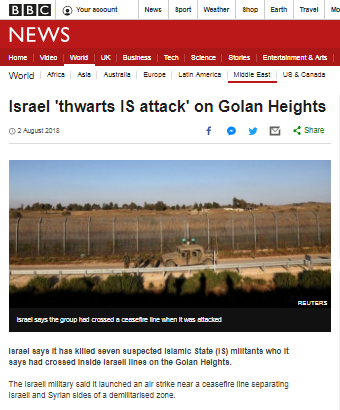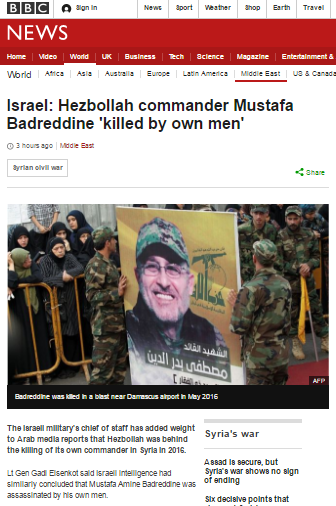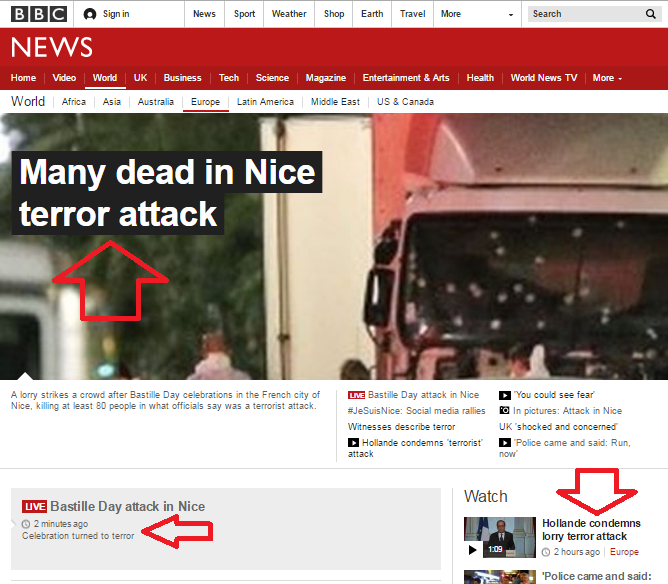On the afternoon of August 2nd a report appeared on the BBC News website’s Middle East page under the superfluously punctuated headline “Israel ‘thwarts IS attack’ on Golan Heights“.
That unnecessary qualification continued in the report’s opening sentences: [emphasis added]
“Israel says it has killed seven suspected Islamic State (IS) militants who it says had crossed inside Israeli lines on the Golan Heights.
The Israeli military said it launched an air strike near a ceasefire line separating Israeli and Syrian sides of a demilitarised zone.”
The BBC’s report also failed to give readers a clear picture of where the incident took place:
“Israel said the group was around 200m (656ft) from an Israeli fence in the zone, delineated by Israel and Syria in 1974.”
As Ynet and other local media outlets reported:
“The incident began around 10:30pm on Wednesday, when the terrorists were spotted around 200 meters from the border fence, just north of the Israel-Syria-Jordan border. […]
“Assad’s forces are currently in the final stages of recapturing of the Syrian Golan and are operating in the south of the Golan against ISIS-linked groups, and as a result of that we see ISIS fighters dispersed throughout the area near the border, as they flee the areas occupied by Assad,” IDF Spokesperson Ronen Manelis said.”
BBC audiences were however given the impression that the fighting in the area is over:
“Syrian rebel fighters and government forces have clashed in the area, though President Bashar al-Assad has regained control of late.”
Readers of the BBC’s report were also told that:
“It is a rare attack by Israel on militants in the area, recently retaken by Syrian forces from IS and rebels.”
Israel of course responds to incidents that take place along that border and so the ‘rarity’ of Israeli actions depends on events initiated by others. The BBC itself reported an incident in November 2016 (albeit belatedly) when Israel responded to ISIS gunfire at a group of IDF soldiers.
The last of those ‘rare attacks’ took place nine days before this report was published, following a cross-border incident involving the same ISIS militia.
“Two rockets from Syria apparently landed in the Sea of Galilee in northern Israel Wednesday […]
“We heard a whistling,” one local recalled. “And then a second whistling. And then we saw [one of the missiles] falling into the water, maybe 50 meters from the beach.”
The projectiles were believed to have been fired from the southern part of the Syrian Golan Heights, where the regime of Bashar Assad has been completing its campaign against the last rebel villages remaining in the area.
Military sources said late Wednesday they inclined to believe that the projectiles were fired by Islamic State jihadists at Syrian regime forces […]
Incoming rocket sirens blared across the Israeli Golan Heights, sending residents of the area scrambling to bomb shelters.”
The IDF later targeted the ISIS rocket launcher.
“Israeli defense officials believe ISIS launched the grad rockets at Israel as a provocation, in an effort to make Israel attack the Syrian army in retaliation. These assessments are based on the fact Assad’s army was attacking ISIS from the north and east, and so any fire to the west would have to be intentional. “
Seeing as the BBC completely ignored that attack at the time it is perhaps unsurprising that it now classifies the latest Israeli response as “rare”.
The BBC’s report closes:
“The BBC’s Middle East correspondent, Tom Bateman, who is in the Israeli-occupied Golan Heights, says that despite the infiltration, Israel sees Iranian forces loyal to President Assad as the biggest threat from inside Syria.
Israel says it will not allow Iran – Israel’s arch-foe – to strengthen its military presence in Syria – something Israel considers a direct threat.
Although Israel is not directly involved in the Syrian conflict, it has increasingly carried air strikes against Iranian assets and military personnel in Syria.”
Bateman did not bother to clarify to readers why Israel should consider Iranian entrenchment in Syria “a direct threat” or that Israeli strikes in Syria have for the most part been directed at Iranian weapons transfers –in breach of UN Security Council resolution 1701 – to its proxy terrorist group Hizballah.
Related Articles:
Twenty-nine hours later – BBC News reports Golan cross-border attack




